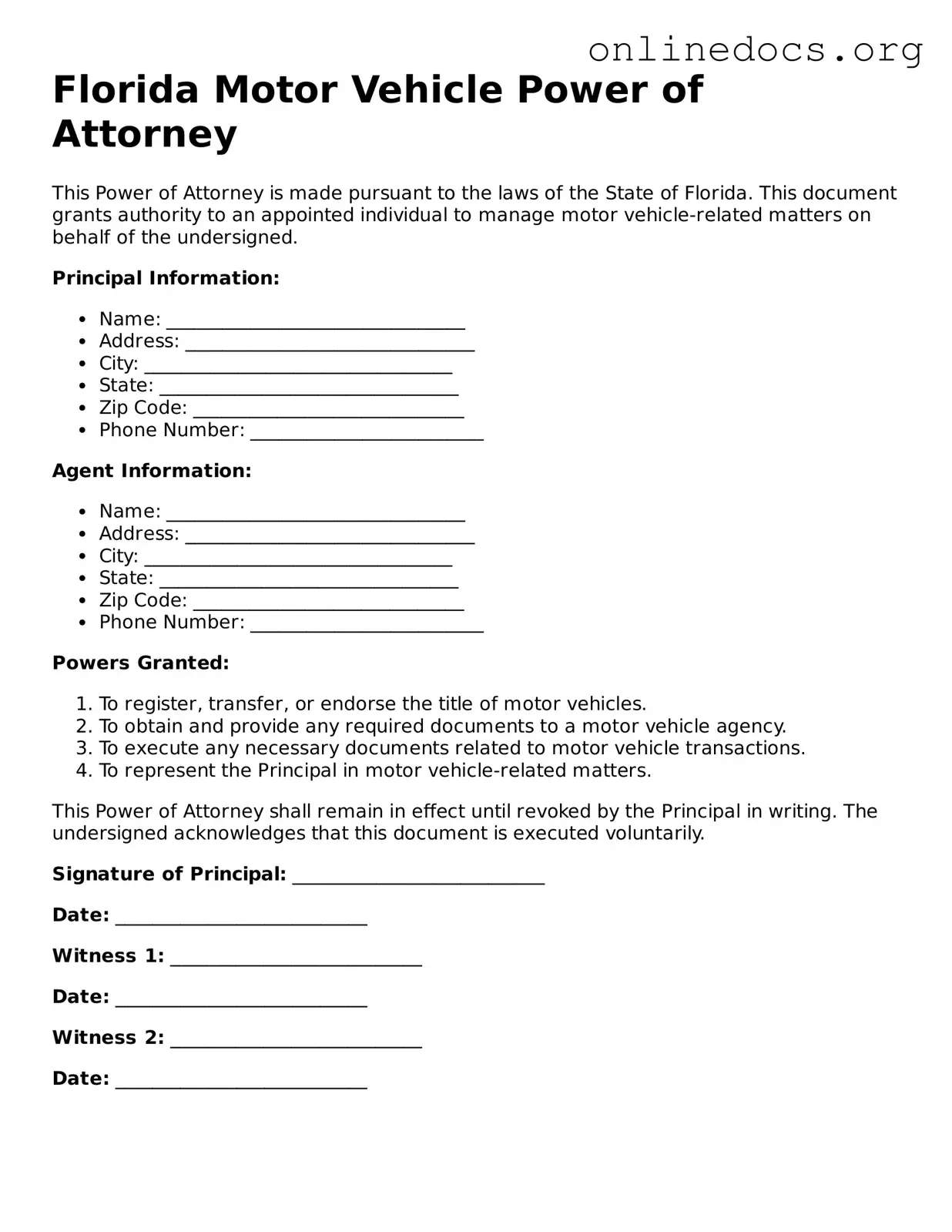The Florida Motor Vehicle Power of Attorney form is similar to a General Power of Attorney. Both documents allow one person to act on behalf of another in various legal matters. A General Power of Attorney covers a broad range of decisions, including financial and healthcare matters. In contrast, the Motor Vehicle Power of Attorney is specifically tailored for vehicle-related transactions, such as transferring title or registering a vehicle. This makes the latter more focused, while the former provides a wider scope of authority.
Another document that shares similarities is the Limited Power of Attorney. Like the Motor Vehicle Power of Attorney, a Limited Power of Attorney grants specific powers to an agent. However, the Limited Power of Attorney can be used for various purposes beyond vehicle transactions. For instance, it might be employed for real estate dealings or financial transactions. The key difference lies in the scope of authority, with the Limited Power of Attorney being broader than the Motor Vehicle version but still restricted to specific tasks.
The Durable Power of Attorney is another related document. This form remains effective even if the principal becomes incapacitated. While the Motor Vehicle Power of Attorney is typically used for immediate vehicle transactions, a Durable Power of Attorney can cover ongoing decisions in various areas, including finances and healthcare. This durability provides peace of mind, knowing that the designated agent can continue to act on behalf of the principal when needed.
For enhancing your recruitment process, obtaining a thorough understanding of a candidate’s employment history is vital. To facilitate this, you can easily fill out the essential Employment Verification form by accessing the link here: Employment Verification process made simple.
A Medical Power of Attorney also bears similarities, as it allows someone to make healthcare decisions for another person. While the Motor Vehicle Power of Attorney focuses on vehicle matters, both documents empower an agent to act on behalf of the principal. The Medical Power of Attorney is crucial in health-related situations, ensuring that the principal’s wishes are honored when they cannot communicate them directly.
The Vehicle Title Application form is another document that parallels the Motor Vehicle Power of Attorney. Both are used in the context of vehicle ownership and transactions. The Vehicle Title Application is essential for officially registering a vehicle, while the Motor Vehicle Power of Attorney allows someone to handle the title transfer on behalf of the owner. Both documents are vital in ensuring that vehicle ownership is properly documented and transferred.
A Bill of Sale is also relevant in this context. This document serves as proof of the sale of a vehicle, detailing the transaction between the buyer and seller. While the Motor Vehicle Power of Attorney allows someone to act on behalf of the seller or buyer, the Bill of Sale finalizes the transaction. Both documents are crucial in the process of buying or selling a vehicle, ensuring that all parties are protected and informed.
The Release of Liability form is another important document related to vehicle transactions. When a vehicle is sold, the seller wants to ensure they are no longer responsible for any liabilities associated with that vehicle. The Motor Vehicle Power of Attorney can enable an agent to complete this form on behalf of the seller, ensuring that the seller’s interests are protected. Both documents work together to facilitate a smooth transaction and transfer of responsibility.
Lastly, the Vehicle Registration form is similar to the Motor Vehicle Power of Attorney. This form is necessary for registering a vehicle with the state. While the Motor Vehicle Power of Attorney allows someone to handle the registration process on behalf of the owner, the Vehicle Registration form is the official document that must be completed and submitted. Both are essential in the ownership and legal recognition of a vehicle.
